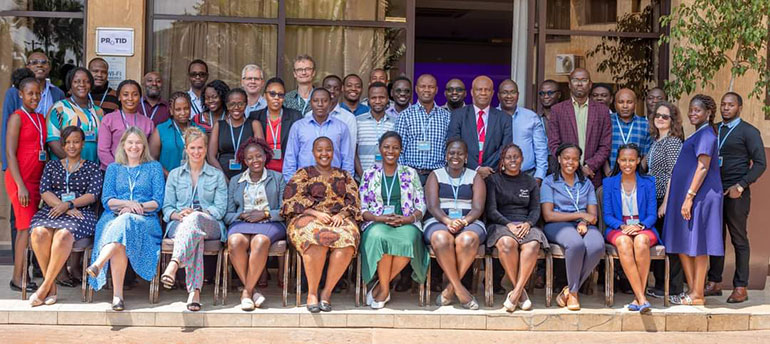Kiwi professors combatting the world’s deadliest infectious disease
On this page

The PROTID consortium at the annual meeting in July in Kampala, Uganda. Professor Philip Hill, 5th from left at the back, and Professor Katrina Sharples 2nd from left seated at front from the University of Otago designed key aspects of the PROTID trial.
With over a million deaths each year, tuberculosis (TB) is the world’s deadliest infectious disease. Senior Epidemiologist Professor Philip Hill and Senior Statistician Professor Katrina Sharples of the University of Otago aim to reduce this global problem as part of an international research project funded through Horizon Europe.
About a quarter of the global population live with latent TB infection, experiencing infection with the pathogen with no symptoms. Of these people, 5 to 10 per cent go on to develop active TB at some point in their lives. But despite being endemic to much of the world, TB is treatable and can also be prevented.
“TB is a key prevention priority area of the European Commission’s European and Developing Countries Clinical Trials Partnership (EDCTP),” says Philip.
“It is also an area on which we have a longstanding collaboration with Prof Reinout van Crevel’s group at Radboud University, in the Netherlands.
“We previously collaborated with Universitas Padjadjaran in Indonesia on a research project on TB in people with diabetes, and results from that research suggested a trial would be worth conducting.”
Short for prevention of tuberculosis among people with diabetes, PROTID collaborators include scientists and clinicians from institutes in the Netherlands, Uganda, Tanzania, United Kingdom and New Zealand. The project promotes African leadership, and Professors Philip and Katrina both supervise African PhD students on the project.
“Through our Horizon Europe research project, PROTID, we will perform the world’s first randomised controlled trial with a focus on a group of people at an even greater risk of contracting TB – those with diabetes,” says Philip.
“People with diabetes face a three times higher chance of developing TB than those without,” Katrina adds.
“Additionally, they often suffer from more severe cases. They have a higher risk of treatment failing or TB recurring and are at greater risk of dying.”
Philip says a major question in global TB control is how to prevent people developing TB, and who to target with preventive approaches.
“This study will provide crucial information about the benefits of targeting people with diabetes in areas endemic with TB. Through PROTID, 3000 people with latent TB and diabetes in Tanzania and Uganda will take part in the trial.”
When asked what he’d say to others looking to apply for Horizon Europe funding Philip says, “make sure you have the right project, consortium and admin support”.
“Support staff are vital to ensure the right things are in the right place in proposals. Understanding the application forms and processes is a skill itself, so having great support will allow researchers to focus as much as possible on the novelty and technical aspects of their science. Be prepared for a lot of hard work and adjusting to the way the proposals are done.
“The money available in the Horizon programme is on a completely different level to what we are used to, while the competition is still very high.”
Over the next 2 years, this project aims to improve our understanding of managing of TB in a high-risk group of people, which will greatly contribute to global TB control.

